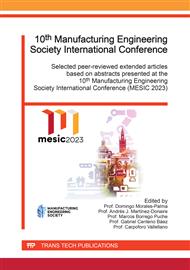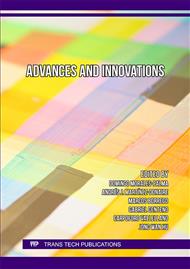[1]
Zhang W, Xu Y. Mechanical properties of polycarbonate: Experiment and modeling for aeronautical and aerospace applications. 2019.
DOI: 10.1016/C2019-0-02488-0
Google Scholar
[2]
Legrand DG, Bendler JT. Handbook of Polycarbonate Science and Technology. 1st ed. New York: CRC Press (Marcel Dekker Inc); 1999.
DOI: 10.1201/9781482273694
Google Scholar
[3]
Wohlers T. History of Additive Manufacturing. WohlersassociatesCom 2017:1–24.
DOI: 10.4018/978-1-5225-2289-8.ch001
Google Scholar
[4]
Parashar BSN, Mittal RK. Elements of manufacturing processes. New Delhi, India: Prentice-Hall of India; 2003.
Google Scholar
[5]
Lenard JG. Metal Forming Science and Practice. Exeter, United Kingdom: Elsevier science; 2002.
Google Scholar
[6]
Ajay, Mittal RK. Incremental Sheet Forming Technologies : Principles, Merits, Limitations and Applications. Chennai, India: CRC Press; 2020.
DOI: 10.1201/9780429298905
Google Scholar
[7]
Silva MB, Alves LM, Martins PAF. Single point incremental forming of PVC: Experimental findings and theoretical interpretation. Eur J Mech A/Solids 2010;29:557–66.
DOI: 10.1016/j.euromechsol.2010.03.008
Google Scholar
[8]
Alkas Yonan S, Silva MB, Martins PAF, Tekkaya AE. Plastic flow and failure in single point incremental forming of PVC sheets. Express Polym Lett 2014;8:301–11.
DOI: 10.3144/expresspolymlett.2014.34
Google Scholar
[9]
Bagudanch I, Centeno G, Vallellano C, Garcia-Romeu ML. Revisiting formability and failure of polymeric sheets deformed by Single Point Incremental Forming. Polym Degrad Stab 2017;144:366–77.
DOI: 10.1016/j.polymdegradstab.2017.08.021
Google Scholar
[10]
Franzen V, Kwiatkowski L, Martins PAF, Tekkaya AE. Single point incremental forming of PVC. J Mater Process Technol 2009;209:462–9.
DOI: 10.1016/j.jmatprotec.2008.02.013
Google Scholar
[11]
Martins PAF, Kwiatkowski L, Franzen V, Tekkaya AE, Kleiner M. Single point incremental forming of polymers. CIRP Ann - Manuf Technol 2009;58:229–32.
DOI: 10.1016/j.cirp.2009.03.095
Google Scholar
[12]
Le VS, Ghiotti A, Lucchetta G. Preliminary studies on single point incremental forming for thermoplastic materials. Int J Mater Form 2008;1:1179–82.
DOI: 10.1007/s12289-008-0191-0
Google Scholar
[13]
Bagudanch I, Garcia-Romeu ML, Centeno G, Elías-Zúñiga A, Ciurana J. Forming force and temperature effects on single point incremental forming of polyvinylchloride. J Mater Process Technol 2015;219:221–9.
DOI: 10.1016/j.jmatprotec.2014.12.004
Google Scholar
[14]
Davarpanah MA, Mirkouei A, Yu X, Malhotra R, Pilla S. Effects of incremental depth and tool rotation on failure modes and microstructural properties in Single Point Incremental Forming of polymers. J Mater Process Technol 2015;222:287–300.
DOI: 10.1016/j.jmatprotec.2015.03.014
Google Scholar
[15]
Durante M, Formisano A, Lambiase F. Incremental forming of polycarbonate sheets. J Mater Process Technol 2018;253:57–63.
DOI: 10.1016/j.jmatprotec.2017.11.005
Google Scholar
[16]
Marques TA, Silva MB, Martins PAF. On the potential of single point incremental forming of sheet polymer parts. Int J Adv Manuf Technol 2012;60:75–86.
DOI: 10.1007/s00170-011-3585-y
Google Scholar
[17]
Centeno G, Martínez-Donaire AJ, Morales-Palma D, Vallellano C, Silva MB, Martins PAF. Novel experimental techniques for the determination of the forming limits at necking and fracture. Mater Form Mach Res Dev 2015:1–24.
DOI: 10.1016/B978-0-85709-483-4.00001-6
Google Scholar
[18]
Carothers WH, Hill JW. Studies of polymerization and ring formation. XV. Artificial fibers from synthetic linear condensation superpolymers. J Am Chem Soc 1932;54:1579–87.
DOI: 10.1021/ja01343a051
Google Scholar
[19]
Rosa-Sainz A, Centeno G, Silva MB, López-Fernández JA, Martínez-Donaire AJ, Vallellano C. On the Determination of Forming Limits in Polycarbonate Sheets. Materials (Basel) 2020;13:1–17.
DOI: 10.3390/ma13040928
Google Scholar
[20]
Martínez-Donaire AJ, García-Lomas FJ, Vallellano C. New approaches to detect the onset of localised necking in sheets under through-thickness strain gradients. Mater Des 2014; 57: 135-45.
DOI: 10.1016/j.matdes.2014.01.012
Google Scholar
[21]
ASTM-D638-14. Standard Test Method for Tensile Properties of Plastics. ASTM Stand 2014.
Google Scholar
[22]
Lampman S. Characterization and failure analysis of plastics. vol. 41. United States: 2004.
Google Scholar
[23]
Rosa-Sainz A, Centeno G, Silva MB, Vallellano C. Experimental failure analysis in polycarbonate sheet deformed by spif. J Manuf Process 2021;64:1153–68.
DOI: 10.1016/j.jmapro.2021.01.047
Google Scholar
[24]
Legrand DG. Crazing, yielding, and fracture of polymers. I. Ductile brittle transition in polycarbonate. J Appl Polym Sci 1969;13:2129–47.
DOI: 10.1002/app.1969.070131010
Google Scholar
[25]
Morgan RJ, O'Neal JE. Modes of deformation and failure of polycarbonate. Polymer (Guildf) 1979; 20: 375–87.
Google Scholar
[26]
Yan C, Han J, Zhang J, Zhao F, Liu C, Shen C. The influence of sub-Tg annealing on environmental stress cracking resistance of polycarbonate. Polym Test 2016;56:364–8.
DOI: 10.1016/j.polymertesting.2016.09.010
Google Scholar
[27]
Bagudanch I, Garcia-Romeu ML, Sabater M. Incremental forming of polymers: Process parameters selection from the perspective of electric energy consumption and cost. J Clean Prod 2016;112:1013–24.
DOI: 10.1016/j.jclepro.2015.08.087
Google Scholar



